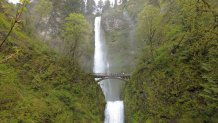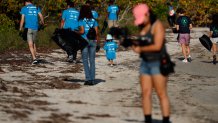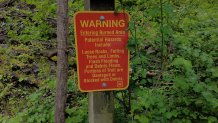The Pacific Northwest is famous for its rain, but recent climate change has brought drought, wildfires and landslides, forcing a Portland, Oregon, tour company to restructure its outings along the Columbia River Gorge.
America’s Hub World Tours canceled 360 trips while the Eagle Creek Fire burned in 2017, when areas along the river were shut down and trees and vegetation were scorched. Today the damage is still visible and a sign along the Horsetail Falls Trail warns hikers to watch for loose rocks, falling trees and flash flooding.
“The environment piece is so critical that we adjust our tours and the commentary,” said a co-owner of America’s Hub World Tours, David Penilton.

Tourism both is vulnerable to climate change and contributes greenhouse gases that are worsening global warming. By 2030, transportation-related carbon dioxide emissions from tourism are projected to grow 25% from 2016 levels, according to the United Nations’ World Tourism Agency, which is responsible for promoting sustainable tourism. Those emissions will account for 5.3% of all manmade emissions and 22% of emissions from transport. Tourism’s future depends on action on both fronts, safeguarding the places visitors want to see and lessening the impact that the industry has.
“The cost of inaction with regards to climate will be in the long run larger than the cost of any other crisis,” the World Tourism Agency says in a report released in 2019.
Introducing the Melanin Miami Tour
In Florida, Keymia Sharpe faces a different climate change threat. The owner of Key2MIA, she offers a tour emphasizing the critical role African-Americans and Caribbean-Americans played in Miami’s history, her Melanin Miami Experience. She worries that important sites will fall victim to the state’s rising sea levels.
One such spot is Virginia Key Beach Park, which opened in 1945 as Miami-Dade County’s “colored only” beach. It thrived for decades but was shut down in the early 1980s because of high maintenance costs. In 2008, after a $30 million master plan restoration was begun, it reopened to the public for the first time.

“Virginia Key Beach, it would be a shame to see such a gem being truly affected to where now it's not possible for us to be able to have that experience or to share it with those who are traveling here,” Sharpe said. “So that's kind of the biggest concern for me, not really being able to share a lot of these historical gems that are here much longer.”
Virginia Key Beach Park is on a 1,000-acre barrier island and is especially susceptible to beach erosion. Parts of the park are seeing significant erosion, according to the city of Miami, which jointly owns it with Miami-Dade County. Wooden structures called groynes, barriers built out into the ocean, stopped some damage over the years, as did coastal dunes planted by volunteers, said Charles Weyman, the park’s education and outreach coordinator.
“Without these two factors, we wouldn’t be standing on the beach,” Weyman said. “This all would be underwater. And for us, we notice that every year that sea level rise is real and it’s really getting worse.”
Miami-Dade County, with its expensive development on the waterfront and low-lying land, must contend with its expected sea level rise, two feet or more by 2060, according to climate models. Last year, it released a strategy for living with that additional water. It would elevate homes and other buildings to protect them from storm surges, build on higher ground along transit corridors, develop waterfront parks and make more space for water throughout neighborhoods.
Virginia Key Beach Park plans to add a museum and it will be building up, Weyman said.
“Our museum is going to be on stilts so that’s actually going to be raised and elevated because with sea level rise, it’s not an if, but it’s a when,” he said.

Miami saw heavy rains this past first weekend of June, flooding one of the attractions that Sharpe includes on her Melanin Miami Experience. The Lyric Theater, which opened in 1913 and today is owned by The Black Archives, posted photos on its Instagram showing water pooling below the stage around the seats.
Built by Geder Walker, a Black man from Georgia, it was a major entertainment center for Black performers in Miami, according to its history.
The theater's owners knew that the front of the theater was below the water table, according to the Instagram post.
"But this is a first," it reads.
Florida Tourism Rebounds
Florida’s tourism is recovering from shut-downs during the coronavirus pandemic. The state reported a record number of travelers in the first quarter of 2022 following a COVID-induced fall off. Thirty-six million people visited, besting even pre-pandemic numbers. The number of visitors rose more than 1.3% from the first quarter of 2019.
Most people are drawn by the water and the weather, but Keymia Sharpe hopes her tours will also give them a sense not only of Miami’s history but also its fragile ecology.
“Miami is such a hub for tourism, it is something to be concerned about,” she said.
After the start of the pandemic, she realized that more people from the Miami area were signing up for her tours, wanting to explore their own backyard.
"I think a lot of people, especially now, are realizing that there’s a lot more to Miami than just the beaches," she said. "There’s a lot of history, a lot of culture that’s here and just, you know, kind of allowing themselves to have that moment and to really kind of go off the beaten path."

Early in the pandemic, tourism saw deep cuts, losing nearly $500 billion in travel spending, according to the U.S. Travel Association. Since then, local travel has grown in popularity. Vrbo or Vacation Rental by Owner reported last year that vacation homes for short-distance trips of up to 250 miles rose by more 20% compared to 2019 and made up nearly 40% of stays booked.
A study by Expedia Group, the online travel company, looked at sustainable travel and how it is viewed by customers. Nearly 70% said it involved lessening environmental impacts but around 65% cited both supporting local economies and supporting local cultures and communities. Three in five travelers said they had chosen more environmentally friendly transportation or lodging but they also note the costs.
“We’re seeing ski destinations without snow in the winter. We're seeing beaches increasingly eroded,” said Aditi Mohapatra, the vice president of Global Social Impact and Sustainability at Expedia Group. “So there's the kind of physical manifestations of climate change that are having a real impact on destinations. I think we're starting to see travelers that are more sensitive and aware about the impacts of climate change and the impacts of travel on climate change. So we're starting to see more interest from travelers in sustainable travel options and solutions.”
One key finding offered a hint of how much work must still be done. Seven in 10 travelers said they felt overwhelmed by starting the process of being a more sustainable traveler.
Expedia is part of a coalition called Travalyst, a non-profit led by Prince Harry, whose goal is to bring sustainable travel into the mainstream.
Fires Close Tourist Stops
In Oregon, the Eagle Creek Fire set nearly 47,000 acres ablaze, shut down tourist attractions and filled the Willamette Valley with smoke. The state like other parts of the West is in a prolonged drought that may be perpetual, according to a paper published in March the Proceedings of the National Academy of Sciences.
“This fire was actually the very first time in my entire life that we've had smoke in downtown Portland, even though we've had forest fires every year,” tour guide Adam Smith said.
Now the area must contend with worsening landslides. Fences have been installed to contain falling rocks and trees. Two years ago, there were two large landslides along the Columbia Scenic Highway, killing a woman and closing a section of waterfalls for six months.
“All the ice on the mountains, the glaciers are shrinking,” Smith said. “Our year round skiing opportunities are disappearing on Mount Hood and the rivers are lower. And people like me that love rafting and kayaking, we have to time our trips to the rivers for the water flows.”

America’s Hub World Tours was forced to cancel or modify 600 tours because of the smoke. It shifted tours from the west end of the Columbia River Gorge further east to visit other waterfalls in the gorge’s National Scenic Area. Extreme heat added other problems. Portland suffered through heat waves in 2021 that sent temperatures soaring above 100 degrees and so the tour company limited their vans to six to eight visitors rather than 12 to 14 to keep the air conditioners running.
One of the top attractions, Multnomah Falls, will try to reduce the number of daily visitors between May and October through a paid and timed entry system.
Now America's Hub World Tours includes the devastated areas on its tours, to show nature’s resiliency but also the damage brought by climate change and reckless behavior. The fire was started by a teenager tossing fireworks into a canyon. The company is adding a topic on stewardship and preservation of natural areas in the hopes that it have an effect on younger generations.
When Penilton was younger, he visited the glaciers in southern Argentina, twice. The second time he was shocked at how much they had melted, he said.
“I think that forever etched something in my memory that said, ‘Our world is changing and is happening quicker than what I realize,’” he said.

